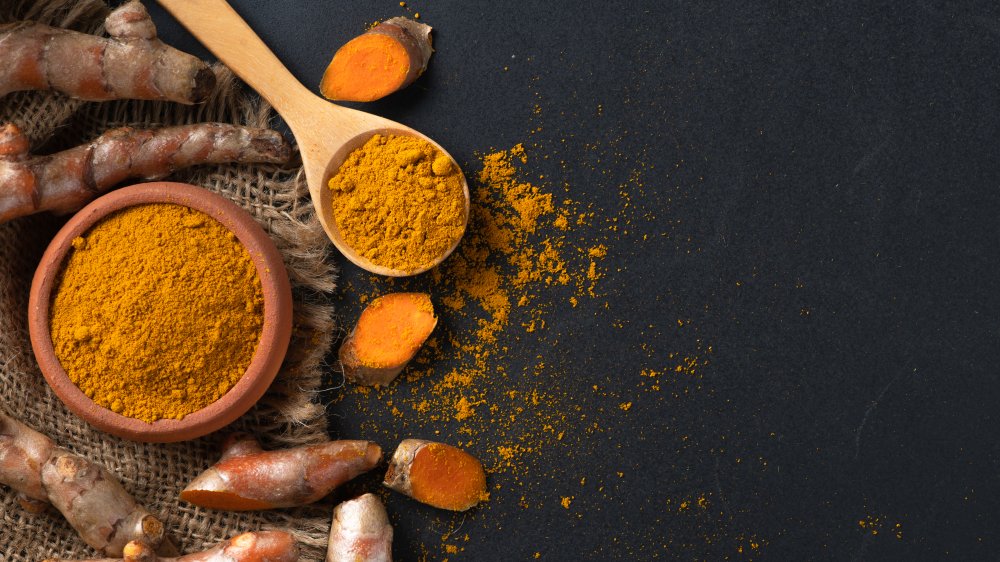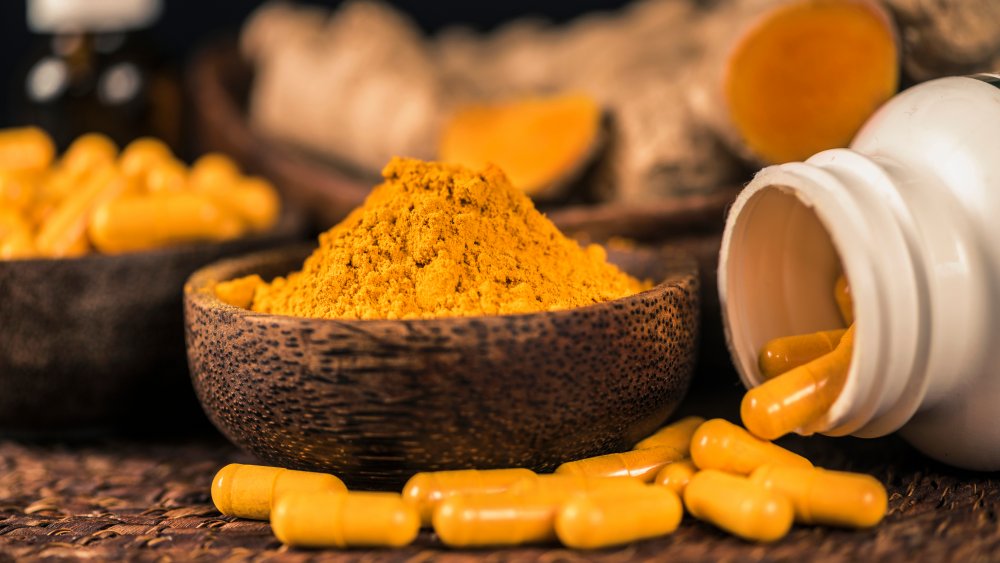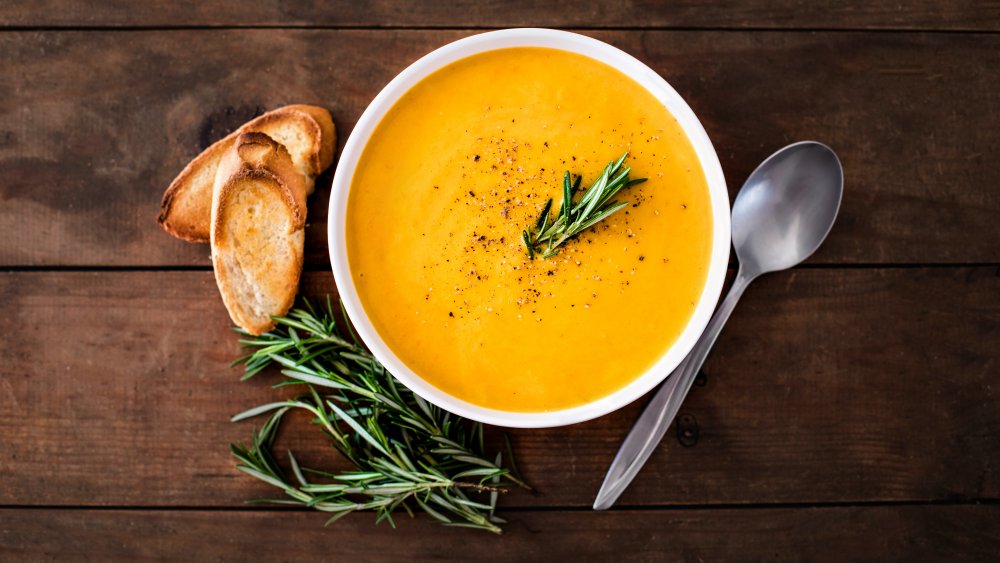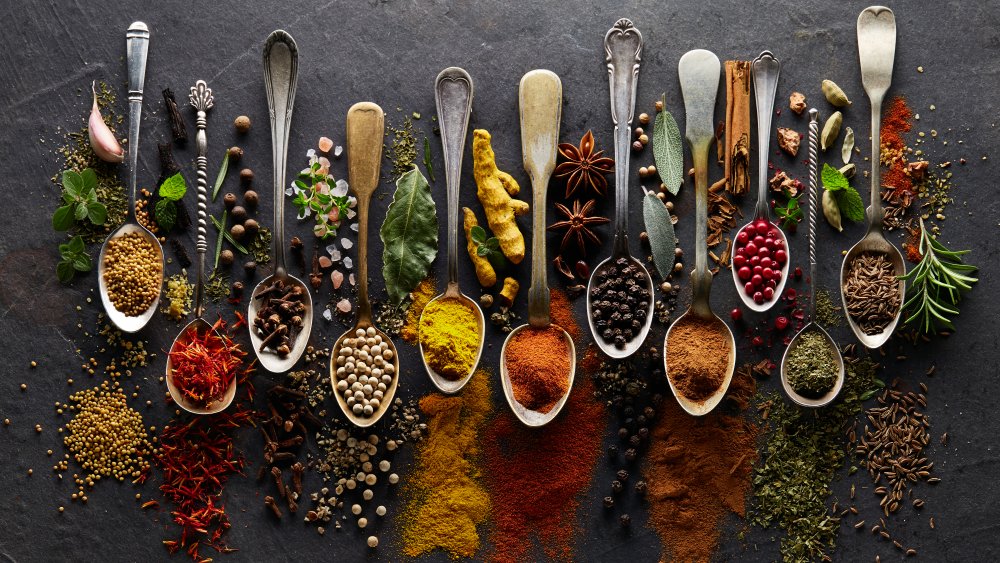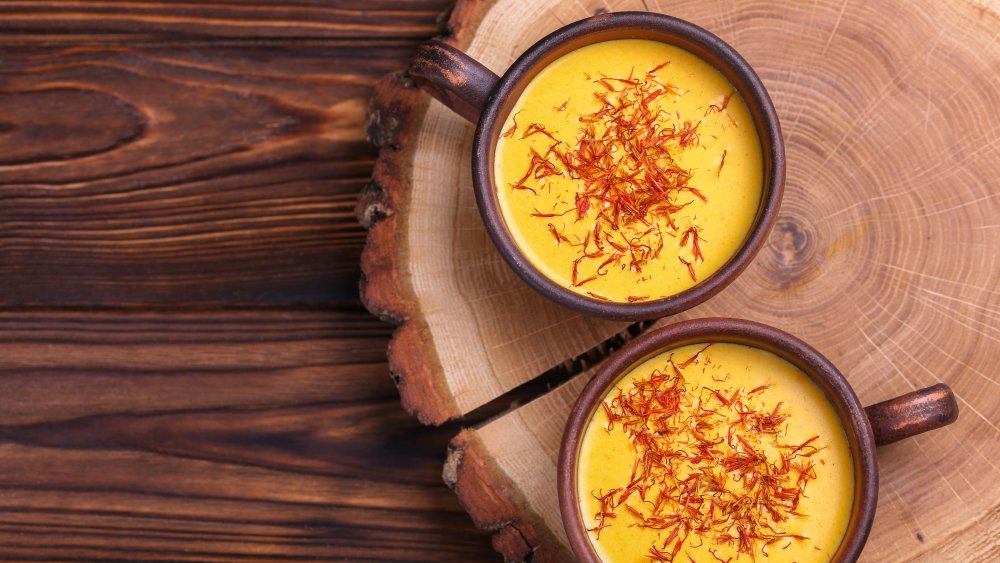Here's What Happens When You Take Turmeric Every Day
What if we told you that your favorite curry ingredients are more than 4,000 years old? Researchers have discovered ancient pots in India holding traces of garlic, ginger, and turmeric, according to PBS. Turmeric is powerful — and we're not just talking about the taste. While there's more research needed, it's been said to possibly stave off heart disease, help prevent cancer, keep your brain healthy, and fight depression, according to Healthline. While the honey-colored spice has been the subject of countless modern studies, Indian communities have been using turmeric medicinally for millennia.
Many of turmeric's health benefits come from a substance called curcumin — and while curcumin is amazing for your body, it's difficult to eat enough turmeric to truly reap the benefits of curcumin. (You'd have to eat a lot of turmeric, and we all know from the cinnamon challenge that it's not wise to gulp down spices by the spoonful.) To absorb enough curcumin, people often consume special turmeric supplements and extracts.
Let's say you're looking to become one of those people. Here are some of the health benefits you might enjoy — and the complications you might want to avoid.
It can benefit your brain
There is a slew of foods out there that can potentially aid your mental health — from yogurt to salmon to spinach (via Psychology Today). Turmeric is another food that can help your brain stay happy and healthy. Studies have found that the consistent consumption of curcumin raised serotonin and dopamine levels in mice, according to the Indian Journal of Pharmaceutical Sciences. Researchers have suggested more research on how turmeric actually affects depressive disorders. Still, it's important to note that curcumin can mitigate inflammation — something that appears to be connected with depression. Decreasing chronic inflammation can help to lower the effects of depression, according to Healthline.
Depression isn't the only disease that turmeric might be able to fight. Studies have found that curcumin can raise BDNF levels in the brain — possibly protecting the mind from regressive diseases like Alzheimer's and Parkinson's, according to Psychology Today. Uma Naidoo, a nutritional psychiatrist and trained chef, described turmeric in glowing terms through her book, This Is Your Brain on Food. "[It] adjusts brain chemistry and protects brain cells against toxic damage that leads to depression," she explained (via Today).
It can mitigate arthritis symptoms
Curcumin — that magical nutrient in turmeric — can reduce inflammation. That could be great news for someone handling the effects of osteoarthritis. In 2016, a report in the Journal of Medicinal Food analyzed a handful of turmeric-related studies. The sample sizes of the studies were too small to draw a decisive conclusion about the medicinal merits of turmeric, but some of the evidence suggests it may behave like ibuprofen. While the researchers were quick to call for larger studies, they still believed the limited evidence was strong enough to suggest using turmeric "as a dietary adjunct to conventional therapy" for arthritis.
Other studies show hopeful results. In 2019, researchers studied 139 people with arthritic knees, giving some a daily dosage of curcumin. About 94% of the patients who took curcumin said they felt at least 50% improvement of their symptoms, according to Harvard Health Publishing. Still, according to rheumatologist Robert Shmerling, more research is needed — 139 people is a small sample size, after all.
Possible drawbacks
The effectiveness of curcumin and turmeric is still yet to be determined in many cases. Some research has shown signs that turmeric could reduce the risk of cancer, or even slow its progression, according to WebMD. Many of these studies, however, have been performed on animals — not people, yet. Still, there have been promising results, and a definite need for more research, according to the Mayo Clinic.
Like any food, you can have too much of a good thing. Daily consumption of turmeric at high rates can cause some nausea or an upset stomach, according to WebMD. And while curcumin is heralded as a beneficial supplement, you should avoid taking it if you're pregnant — consistent turmeric supplements can put a pregnancy at risk.
Another obstacle when it comes to turmeric? It's not an easy spice for the human body to absorb — in other words, your gastrointestinal tract might hardly be ingesting the substance, according to the New York Times. Pairing turmeric with black pepper can actually change that, though. Black pepper contains an alkaloid known as piperine, which can help the body to properly absorb turmeric's nutrients as it passes through the digestive system. Supplement producers are working to find the most effective combination. When it comes to supplements, avoid those that produce synthetic curcumin — those could contain lead.
Adding a dash of turmeric
Supplements provide a quick, convenient way to consume, and hopefully absorb, turmeric. Still, you can also incorporate it into your diet — when turmeric is consumed with a fat, the body may absorb it more easily, according to Healthline. And when it comes to mouth-watering turmeric recipes, there are tons of options.
Maunika Gowardhan, a chef and writer who grew up in Mumbai, includes turmeric in her recipe for matar paneer — a dish of soft cheese, peas, and spiced tomato sauce. Golden milk, a traditional Indian recipe that's become popular in the states, infuses turmeric into the rich beverage, along with cardamom, ginger, and black peppercorns, according to food blog Cook with Manali. Or, you can throw it into a mango lassi with unsweetened yogurt, according to Food and Wine.
While some of turmeric's supposed health benefits may require more research, that doesn't mean there's no reason to try some now. After all, it still contains an antioxidant — and it tastes pretty amazing.
